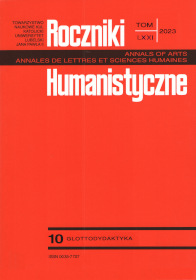Потенциал формального обучения для неформальной подготовки учителей русского языка в Эстонии
The Potential of Formal Education in the Non-Formal Education of Russian Language Teachers in Estonia
Author(s): Irina Mikhailovna Moissejenko, Natalia Vladimirovna TšuikinaSubject(s): Language and Literature Studies, Foreign languages learning
Published by: Towarzystwo Naukowe KUL & Katolicki Uniwersytet Lubelski Jana Pawła II
Keywords: public demand; curriculum; self-paced study; informal learning; electronic study materials
Summary/Abstract: This article describes the method of educating Russian teachers in Tallinn University. The respective curriculum is presented, and its structure and components analysed. The authors review the aims of the subject-specific didactics courses, their content and the forms of the classes, as well as the role and place of teaching internships in the process of teaching training. Most of the attention is paid to the adaptation of the existing curricula to the needs of informal Russian teacher training within the campaign “Noored Kooli” (Young People to Schools), open learning and microgrades. Also, the handbook How to Prepare and Give a Lesson in Russian as a Foreign Language is looked at, as well as at some e-platforms and resources for videoconferences and lectures. This article reveals the potential of the resources referred to in classwork and in independent work by students within both formal and informal Russian teacher training. The authors elaborate on the idea that informal training can be more effective within some special terms, for example, if the training is based on general, cross-functional, but flexible, curricula, which have been evaluated during the long period of training specialists for schools.
Journal: Roczniki Humanistyczne
- Issue Year: 71/2023
- Issue No: 10
- Page Range: 37-52
- Page Count: 16
- Language: Russian

